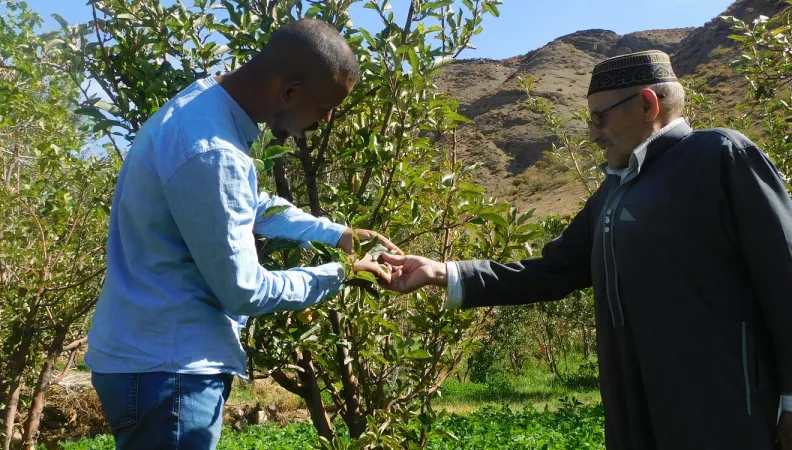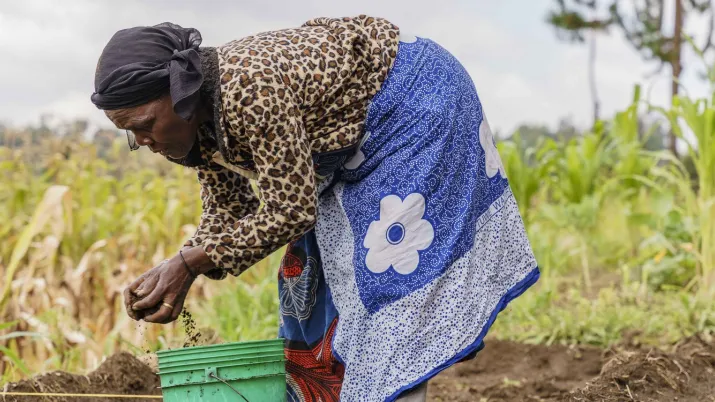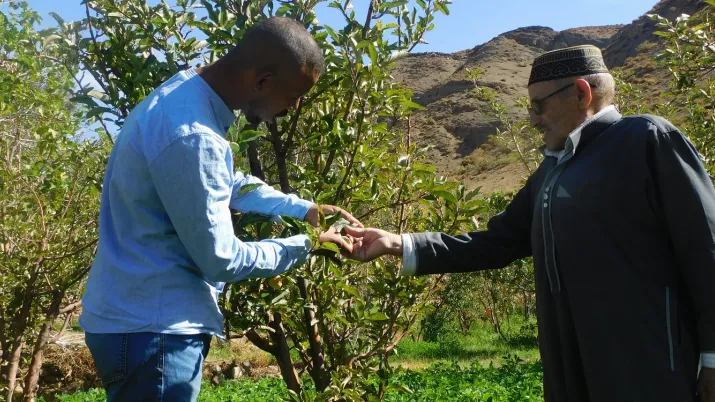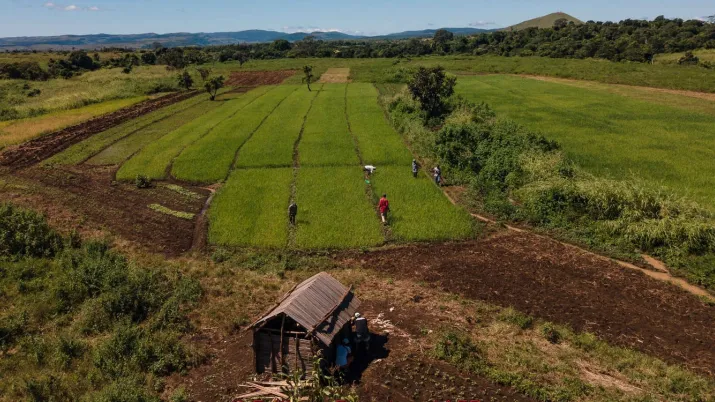Share the page
Driving the transition to sustainable agriculture in Ghassate, Morocco
Published on

At the 2025 edition of the Paris International Agricultural Show, Morocco will take center stage. In the south-east of the country, where agriculture is often critical to survival, the sector is facing many challenges due to fragile soil, limited water resources and changing climate conditions. In response to this, in Ghassate, the Agricultural Sector Policy Support Program (PAPSA) has been sowing the seeds for a sustainable transition since 2014. We spoke to some beneficiaries of the program...
In the Ghassate region of Morocco, climate change is a major threat to agriculture. Led by NGO Agrisud International and the Norsys Foundation, and co-financed by AFD, PAPSA (Agricultural Sector Policy Support Program) has been driving an ambitious agroecological transition, helping hundreds of families to work differently with the land. The key to the project’s success is the commitment, passion and exceptional collaborative work between a team of experts and beneficiary farmers.
Imane Taaime, Director of the Norsys Foundation, is clear about the PAPSA program's main objective: reconcile requirements on the ground with sustainable development strategies. “At the start, we were working with 11% of farms in the community. Today, that figure has grown to 58%,” she says. “This project has expanded at lightning speed, thanks to a combination of sustainable practices, economic structuring and a regional vision.” From the outset, PAPSA adopted a multi-faceted approach, while focusing on three complementary areas: improving farms, structuring economic sectors and bringing local stakeholders onboard. “It’s not just about training, but also transforming practices to establish a sustainable framework,” adds Imane Taaime.
See also: Enriching soil fertility worldwide for food security
A new agricultural model
PAPSA aims to transform farms while respecting natural resources. Aznag Mohammed, a 40-year-old farmer based in Izerki, is delighted by these changes. Since completing the training, he has switched from traditional planting methods to row planting, and his crops are reaping the benefits. “Before, our work was more haphazard and our meager harvests were often destroyed by drought and other extreme weather conditions,” he says. “Now we even produce our own manure which stops the seeds we plant from getting damaged. Everything we produce is local and organic and it’s going really well.”
With PAPSA’s crop diversification techniques and training programs, beneficiaries can now set their sights higher than subsistence farming. “The best thing I’ve learned about is sales,” says Abdelaziz Kassi, a farmer based in Ait Ali Moussa. “I was too embarrassed to talk about money before. It wasn’t part of my culture; generosity was the norm. Now selling has become second nature, and it can even get a bit competitive between us.”
Livestock breeding, a strategy for resilience
Sheep farming, particularly in the foothills and mountain areas, is also a key part of the project. By teaching farmers about sheep pen hygiene, management of the reproductive cycle and suitable animal feed, PAPSA has significantly reduced animal losses and boosted farmers’ incomes. “In the past, it felt like I was working really hard for very little gain,” says Fatima Kamal, a 51-year-old breeder from Asseghmou. “Today, my herd is healthy, and I no longer have to buy sheep for Eid. People now come to me to buy them instead.”
See also: How traditional trades are helping rebuild communities in Morocco
Developing value chains for the future
PAPSA not only supports individual and family farms, it also helps establish robust, independent value chains. The Ghassate dairy cooperative, headed by Abdelkabir El Imam, is a prime example: “Our cows' milk was going to waste far too often. So, we founded this cooperative to optimize use and improve living conditions for our farmers.” PAPSA has also launched initiatives in other sectors, such as beekeeping, market gardening, forage crops, hydro-agricultural development and arboriculture, while connecting small producers to markets. Creating structured value chains will help ensure economic stability over the long term and promote sustainable local development.
A dedicated team
The secret to PAPSA's success lies in the unwavering commitment of its local team, made up of agricultural technicians, trainers, livestock specialists and coordinators. Every week, these professionals work on the ground to support the 750 beneficiary farms, adapt programs to their needs and help them progress. “Some of our initiatives, like literacy courses, are not directly related to farming, but they are essential to make beneficiaries more independent and help them get the most out of the project,” says Imane Taaime.
See also: “Women are the backbone of agriculture in Haiti”
A replicable model
While the PAPSA project is in its final phase (2023-2026), the team is working hard to bring about lasting change while exploring new opportunities for expansion. To ensure this transition continues, representatives from farms are being trained to become local experts, and strong partnerships are being established, like those with the Ouarzazate Regional Agricultural Development Office (ORMVAO) and the Generation Green program. “Our project is worth replicating. Its unique combination of technical, economic and human intervention could inspire and help other regions to make the shift to sustainable agriculture,” says Imane Taaime. The PAPSA approach is so effective because it is more than just an agricultural development program: “It’s important not to reduce people to simple indicators. Every family has their own challenges and aspirations, and they deserve personalized solutions.”
Further reading
Reshaping European and African partnerships to advance the agroecological transition
Published on february 25 2025

Driving the transition to sustainable agriculture in Ghassate, Morocco
Published on february 21 2025


